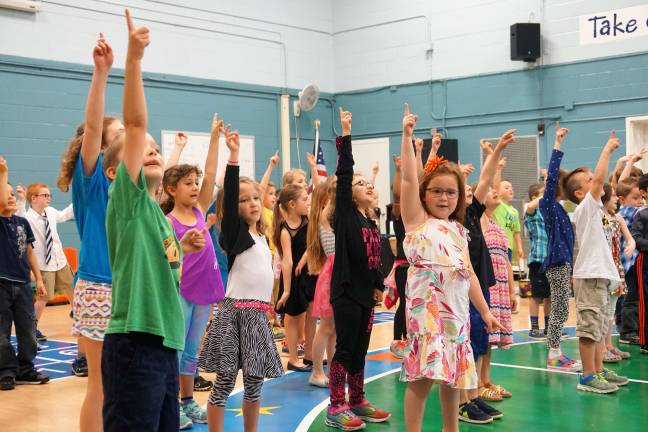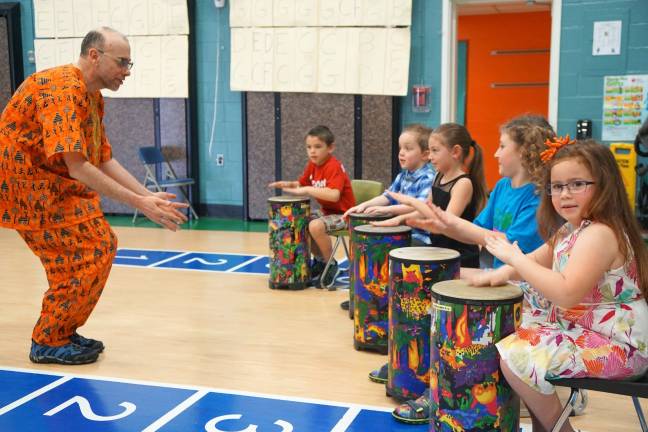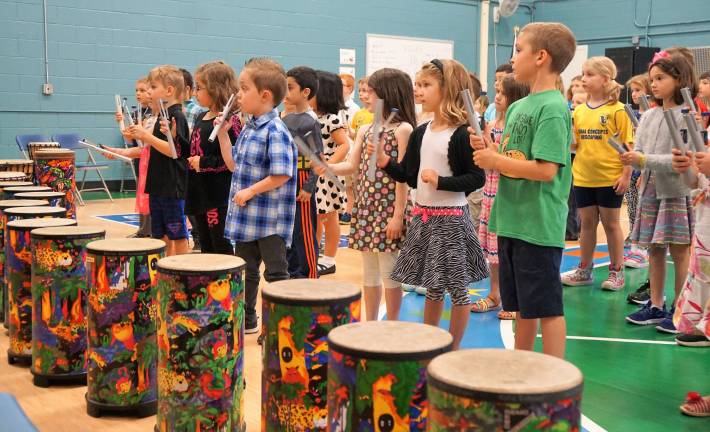Walnut Ridge get up and dance



VERNON — “Sasha. Sasha. 1, 2, 3!” danced Walnut Ridge Primary students, April 28, to fun accordion music. The students twirled arm in arm along with intricate patty cake like movements, as the music tempo sped faster and faster, along with the students.
Throughout the week of April 24, music teacher Michael Moschella treated parents, grandparents, friends, and neighbors with the culmination of his teaching in both music and movement.
On Friday the first graders wowed an overflowing gym while playing Djembe Drums with their bare hands. So much so, part of the audience, walking into the gym a little bit late, was very surprised to learn first graders were playing the drums in perfect beat together — not the High School Band.
The students also played “Ode to Joy” by Ludwig van Beethoven on bells, with lovely harmonic tones floating through the air.
They next sang “I'm Beethoven, You're Beethoven” to the “Ode to Joy” tune, continuing on to the Woody Guthrie classic, “This Land is Your Land,” with synchronized movements, verse after verse and “My Dog Rags.”
Principal Rosemary Gebhardt explained Moschella uses the John Feierabend music method for children, creating a “tuneful, beatful, artful learning community,” which the children love. Moschella customizes, she said, each show, each day, for the whole week, two classes a day, with an extensive repertoire, while taking into account the needs of each student.
After the concert, deafening, happy voices excitedly talked all at once. Parent after parent came to thank Moschella for the high bar he helped the children achieve.
Retired music teacher Claudia Schoonmaker said she was in awe of what Moschella did with the children. She added, “I don't know how he does it — absolutely amazing.”
Moschella said it is all about first learning to listen, a lot of movement, feeling the beat, and learning to sing it. He said, he uses echo singing and simple folk songs, which are right for their voices. All the books he draws from, Moschella added, are very old games, party and skipping games, plus rhymes. Also he said, “They lead the class,” where he gives students as much opportunity to sing alone as possible.
Moschella mentioned, he attended seven Feierabend classes at a NJEA convention, which transformed his teaching.
During the year, Moschella reviews four musicians with the students: Beethoven, Mozart, Woody Guthrie, and Louis Armstrong. He added, a big part of what they do is improvisation, but the main thing is working at something difficult and not moving forward until everyone in the class has learned. Moschella continued, he provides a highly organized structure, which is very free, thus, giving the student the ability to say, “I want to move this way.”
Then the students go home and do the movement and music with their families. Next October the school will have its family dance night with about 60-70 people. Moschella said, “They bring babies; they bring grandmas. They teach the parents.”
He added, “We don't watch TV; we have too many things to do. They close their eyes while listening to music and answer, “What did you hear? What did you imagine?”
Moschella explained the drums are pre-music reading and very precise. Each classroom time, he does six or seven activities with the students. He said, “It's all additive.”
“Repetition is the key, he concluded, how to make repetition palatable. It's not easy. And I have to stay interested, too. I keep adding different songs and different games. I want the children to be prepared and confident.”